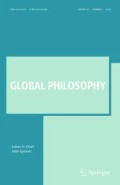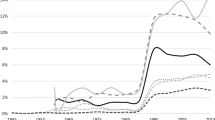Abstract
The paper presents some essential heuristic and constructional elements of Free Process Theory (FPT), a non-Whiteheadian, monocategoreal framework. I begin with an analysis of our common sense concept of activities, which plays a crucial heuristic role in the development of the notion of a free process. I argue that an activity is not a type but a mode of occurrence, defined in terms of a network of inferences. The inferential space characterizing our concept of an activity entails that anything which is conceived of as occurring in the activity mode is a concrete,dynamic, non-particular individual. Such individuals, which I call ‘free processes’, may be used for the interpretation of much more than just common sense activities. I introduce the formal theory FPT, a mereology with anon-transitive part-relation, which contains a typology of processes based on the following five parameters relating to: (a) patterns of possible spatial and temporal recurrence (automerity); (b) kinds of components (participant structure); (c) kinds of dynamic composition; (d) kinds of dynamic flow (dynamic shape); and (e) dynamic context. I show how these five evaluative dimensions for free processes can be used to define ontological correlates for various common sense categories,and to draw distinctions between various forms of agency(distributed, collective, reciprocal, entangled) and emergence (weak, strong,as ‘autonomous system’ (Bickhard/Christensen)).
Similar content being viewed by others
REFERENCES
Andersen, P. et al (eds.): 2000, Downward Causation: Mind, Bodies, and Matter, Aarhus: University of Aarhus Press.
Bache, C.: 1995, The Study of Aspect, Tense and Action-Towards a Theory of the Semantics of Grammatical Categories, Frankfurt a. M.: Peter Lang.
Bickhard, M. and D. Campbell: 2000, ‘Emergence’, in Anderson et al. 2000, 322–349.
Breu, W.: 2000, Probleme der Interaktion von Lexik und Aspekt (ILA), Tübingen: Niemeyer.
Campbell, K.: 1990, Abstract Particulars, Oxford: Blackwell.
Christensen, W and D., M. Bickhard: 2002, ‘The Process Dynamics of Normative Function’, The Monist 85, 3–28.
Carter,W. and H. Hestevold: 1994, ‘On Passage and Persistence’, American Philosophical Quarterly 31, 269–283.
Comrie, B.: 1976, Aspect, Cambridge, UK: Cambridge University Press.
Dik, S.: 1997, The Theory of Functional Grammar, 2nd revised edition by Kees Hengeveld, Berlin: Mouton de Gruyter.
Dowty, D.: 1979, Word Meaning and Montague Grammar, Dordrecht: Reidel.
Gill, K.: 1993, ‘On the Metaphysical Distinction Between Processes and Events’, Canadian Journal of Philosophy 23, 365–384.
Gill, M.-L.: 1989, Aristotle on Substance. The Paradox of Unity, Princeton: Princeton University Press.
Gill, M.-L.: 1994, ‘Individuals and Individuation’, in T. Scaltsas et al. (eds.), Unity, Identity, and Explanation in Aristotle's Metaphysics, Oxford University Press.
Heller, M.: 1990, The Ontology of Physical Objects, Cambridge, UK: Cambridge University Press.
Kearns, K.: 2000, Semantics, Houndmills: Macmillan.
Levin, B.: 1993, English Verb Classes and Alternations, Chicago: University of Chicago Press.
Mayo, B.: 1970, ‘Objects, Events, and Complementarity’, Philosophical Review 70, 340–361.
Mourelatos, A.: 1978, ‘Events, Processes and States’, Linguistics and Philosophy 2, 415–434.
Needham, P.: 1999, ‘Macroscopic Processes’, Philosophy of Science 66, 310–331.
Pelletier, F.J.: 1974, ‘On Some Proposals for the Semantics of Mass Terms’, Journal for Philosophical Logic 3, 87–108.
Pelletier, F.J.: 1978, Mass Terms. Some Philosophical Problems, Dordrecht: Reidel.
Rescher, N.: 2000, Process Philosophy, Pittsburgh: University of Pittsburgh Press.
Rijkhoff, J.: 1991, ‘Nominal Aspect’, Journal of Semantics 8, 291–309.
Rijkhoff, J.: 2002, The Noun Phrase, Oxford: Oxford University Press.
Rijksbaron, A.: 1989, Aristotle, Verb Meaning and Functional Grammar. Towards a New Typology of States of Affairs, Amsterdam: J.C. Gieben.
Sasse, H.: 2002, ‘Recent Activity in the Theory of Aspect: Accomplishments, Achievements, or just Non-Progressive State?’, Linguistic Typology 6, 199–273.
Seibt, J.: 1990a, Properties as Processes. A Synoptic Study in W. Sellars' Nominalism, Reseda, CA: Ridgeview.
Seibt, J.: 1990b, Towards Process Ontology: A Critical Study in Substance-Ontological Premises, Pittsburgh: University of Pittsburgh doctoral dissertation. Published as microfiche with UMI-Dissertation Publication, Michigan.
Seibt, J.: 1995, ‘Individuen als Prozesse: Zur prozess-ontologischen Revision des Substanzparadigmas’, Logos 5, 303–343.
Seibt, J.: 1996a: ‘Non-countable Individuals: Why One and the Same Is Not One and the Same’, Southwest Philosophy Review 12, 225–237.
Seibt, J.: 1996b, ‘The Myth of Substance and the Fallacy of Misplaced Concreteness’, Acta Analytica 15, 61–76.
Seibt, J.: 1996c, ‘Existence in Time: From Substance to Process’, in J. Faye, U. Scheffler, and M. Urs (eds.), Perspectives on Time, Boston Studies in Philosophy of Science, Dordrecht: Kluwer, pp. 143–182.
Seibt, J.: 1996d, ‘Der Umbau des “Aufbau”: Carnap und die analytische Ontologie’, Deutsche Zeitschrift für Philosophie 44, 807–835.
Seibt, J.: 1997, ‘The “Umbau”: From Constitution Theory to Constructionism’, History of Philosophy Quarterly 14, 305–351.
Seibt, J.: 1999, ‘Dinge als Prozesse’, in R. Hüntelmann and E. Tegtmeier (eds.), Neue Ontologie und Neue Metaphysik, Köln: Academia Verlag, pp. 11–41.
Seibt, J.: 2000a, ‘Constitution Theory and Metaphysical Neutrality: A Lesson for Ontology?’, The Monist 83, 161–183.
Seibt, J.: 2000b, ‘Pure Processes and Projective Metaphysics’, Philosophical Studies 101, 253–289.
Seibt, J.: 2000c, ‘Ontology as Theory of Categorial Inference’, in D. Greimann and C. Peres (eds.), Wahrheit-Sein-Struktur. Auseinandersetzungen mit Metaphysik, Hildesheim: Olms Verlag, pp. 272–297.
Seibt, J.: 2000d, ‘The Dynamic Constitution of Things’, in J. Faye, U. Scheffler, and M. Urchs (eds.), Facts and Events, Poznañ Studies in Philosophy of Science 72, 241–278.
Seibt, J.: 2001a, ‘Formal Process Ontology’, in C. Welty and B. Smith (eds.), Formal Ontology in Information Systems: Collected Papers from the Second International Conference, ACM Press: Ogunquit, 333–345.
Seibt, J.: 2001b, ‘Processes in the Manifest and Scientific Image’, in U. Meixner (ed.), Metaphysik im postmetaphysischen Zeitalter/Metaphysics in the Post-Metaphysical Age, Wien: öbv&hpt, pp. 218–230.
Seibt, J.: 2002, ‘Quanta, Tropes, or Processes: On Ontologies for QFT beyond the Myth of Substance’, in M. Kuhlmann, H. Lyre and A.Wayne (eds.), Ontological Aspects of Quantum Field Theory, Singapore: World Scientific, pp. 53–93.
Seibt J.: 2003, ‘Process and Particulars’, in M.Weber (ed.), Process Metaphysics, Munich: Philosophia, forthcoming.
Seibt, J.: forthcoming, Free Process Theory: A Study in Revisionary Ontology, Habilitationsschrift at the University of Konstanz, Germany.
Simons, P.: 1987, Parts: A Study in Ontology, Oxford: Oxford University Press.
Simons, P.: 2000, ‘Continuants and Occurrents’, The Aristotelian Society, Supplementary Volume LXXIV, 78–101.
Simons, P. and C. Dements: 1996, ‘Aspects of the Mereology of Artifacts’, in R. Poli and P. Simons, (eds.), Formal Ontology, Dordrecht: Kluwer, pp. 255–276.
Smith. C.: 1997, The Parameters of Aspect, Dordrecht: Kluwer Academic Publishers.
Stout, R.: 1997, ‘Processes’, Philosophy 72, 19–27.
Taylor, B.: 1985, Modes of Occurrence: Verbs, Adverbs, and Events, Oxford: Blackwell.
Whitehead, A.: 1928, Process and Reality, New York: Macmillan.
Wilson, E. and Ch. Lumsden: 1991, Biology and Philosophy 6, 401–412.
Zemach, E.: 1970, ‘Four Ontologies’, Journal of Philosophy 23, 231–247.
Rights and permissions
About this article
Cite this article
Seibt, J. Free Process Theory: Towards a Typology of Occurrings. Axiomathes 14, 23–55 (2004). https://doi.org/10.1023/B:AXIO.0000006787.28366.d7
Issue Date:
DOI: https://doi.org/10.1023/B:AXIO.0000006787.28366.d7




